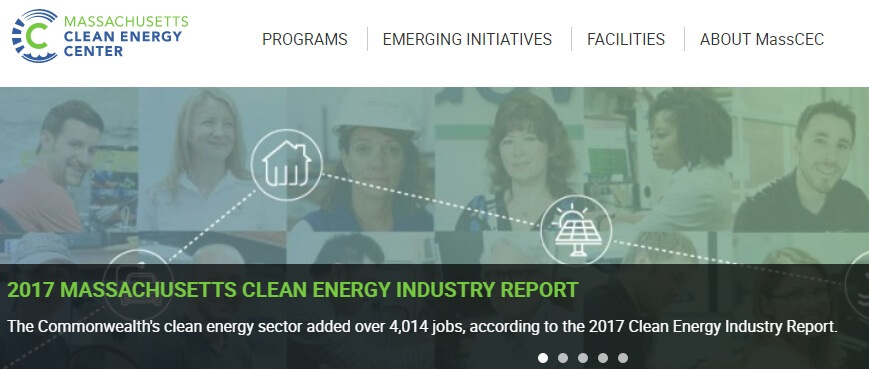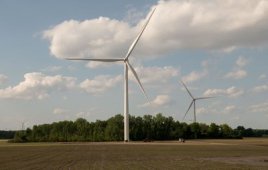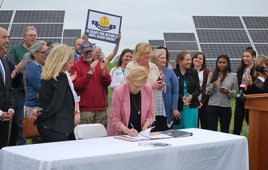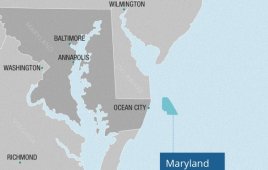The Massachusetts Clean Energy Center (MassCEC) today announced the state’s clean energy sector grew by 4% between 2016 and 2017, employing a total of 109,226 clean energy workers. The figures, released as part of MassCEC’s 2017 Massachusetts Clean Energy Industry Report, found that the number of clean energy jobs in Massachusetts has increased by 81% since 2010.
“This year’s Clean Energy Industry Report demonstrates that Massachusetts continues to host a thriving clean energy sector that supports the Commonwealth’s position as a national leader on innovation and climate action,” said Governor Charlie Baker. “The sector is responsible for significant job growth over recent years and we look forward to continuing our work to support innovative clean-energy employers across Massachusetts in 2018.” 
“The Massachusetts clean energy industry creates high-paying, local jobs while providing environmental and economic benefits to residents and businesses across the Commonwealth,” said Lieutenant Governor Karyn Polito. “Our administration remains committed to supporting the clean energy sector throughout the state and looks forward to continued growth.”
The report found that the clean energy industry employs residents of every region in Massachusetts. Jobs grew over the past year in each of the state’s regions, with the largest growth coming in Southeastern Massachusetts (5.9 %) and Western Massachusetts (5.1 %). Northeast Massachusetts, which includes Boston, accounted for 48% of total clean energy employment in 2017. The number of clean energy establishments in Central Massachusetts grew by 2.9%.
“The clean energy industry is providing strong job opportunities, cost savings, and environmental benefits to Massachusetts residents and businesses,” said Energy and Environmental Affairs (EEA) Secretary Matthew Beaton. “The Baker-Polito Administration looks forward to further collaboration with the Commonwealth’s clean energy industry as we pursue an increasingly diverse and affordable renewable energy portfolio.”
“The clean energy industry remains a vibrant sector in Massachusetts’ innovation ecosystem,” said MassCEC CEO Stephen Pike. “The synergy between the Commonwealth’s universities, entrepreneurs, nonprofits, and businesses is fostering innovation within the industry as well as energy solutions and savings for residents across the state.”
“The clean energy sector continues to experience strong job growth and plays a crucial role driving the state’s innovation economy,” said Department of Energy Resources Commissioner Judith Judson. “As the industry continues to grow, Massachusetts residents will reap the benefits of job creation, economic activity and access to innovative technologies.”
Some additional findings include strong pay for clean energy workers, with more than 68% of workers earning more than $50,000 annually, compared to a median wage of $40,557 for all jobs across Massachusetts. Massachusetts’ innovation sector continued to see strong results, as funding for early-stage research and demonstration reached roughly $582.7 million between 2010 to 2016. And the state’s clean energy manufacturing sector grew steadily in 2017 at 8.6%, now employing 17,079 workers in the Commonwealth.
Building on the Baker-Poltio’s Administration’s national leadership on clean energy, MassCEC released a report, the Massachusetts Offshore Wind Ports and Infrastructure Assessment, to help the offshore wind industry evaluate locations around the state that could be redeveloped to serve the nation’s first commercial-scale offshore wind developments. Additionally, the Baker-Polito Administration announced the Commonwealth’s first awards for energy storage, funding $20 million for 26 projects across the state, and dedicated approximately $13.5 million dollars to increasing statewide access to clean energy technologies for Massachusetts’ low-and moderate-income residents. MassCEC also continued its successful internship program, which has served 372 companies employing 2,522 students, resulting in over 430 full or part-time hires since 2011.
The policies that support this work include a bipartisan comprehensive energy diversification legislation signed by Governor Baker in August 2016 that promotes the administration’s commitment to reducing energy costs while strengthening the state’s clean energy economy and progressing towards Massachusetts’ greenhouse gas reduction requirements. The legislation requires utilities to competitively solicit and contract for approximately 1,200 megawatts (MW) of clean hydropower and approximately 1,600MW of offshore wind.
“The clean energy industry is a fantastic job creator and a great tool to fight the unfortunate realities of climate change,” said Senate President Harriette L. Chandler (D-Worcester). “From the Berkshires to Boston, the clean energy industry represents and serves every resident in the Commonwealth. The industry’s growth is a positive force for change.”
“The strong growth in clean energy jobs continues to help bolster our economy, provide well-paying jobs and protect our environment,” said House Speaker Robert A. DeLeo (D-Winthrop). “With the passage of the 2016 landmark energy law, I believe that Massachusetts will attract even more companies, retain talent and support our hardworking taxpayers.”
“Clean energy is an imperative for our environment and a growing force in our economy,” said Senate Minority Leader Bruce Tarr (R-Gloucester). “Our state’s focused efforts through incentives, robust education and training programs and a supportive regulatory environment are translating into a real success and national leadership in the transition to a more environmentally sound energy portfolio and the good jobs that come with it.”
For the rest: http://www.masscec.com/
Filed Under: Uncategorized




